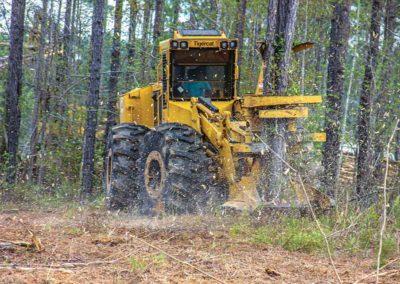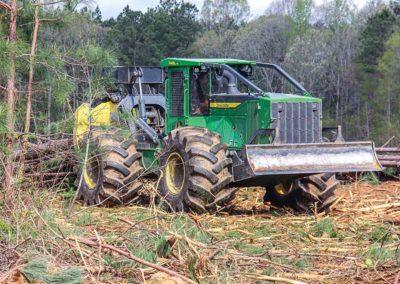June 2023
CAMDEN, South Carolina – Bigger isn’t always better, and in logging, bigger can sometimes be worse. In some cases the small operation running good used machines can make more profit than the large operation with a lot of brand new iron. But the opposite can also be true. Sometimes bigger can be better . . . if you’re bigger in the right ways.
Inside This Issue
COVER: LOTS Going On In South Carolina
CAMDEN, South Carolina – Bigger isn’t always better, and in logging, bigger can sometimes be worse. In some cases the small operation running good used machines can make more profit than the large operation with a lot of brand new iron. But the opposite can also be true. Sometimes bigger can be better . . . if you’re bigger in the right ways.
Article by David Abbott, Managing Editor, Southern Loggin’ Times
SOUTHERN STUMPIN': Lots About LOTS
And now for something completely different: At SLT we seek to chronicle all aspects of the southern logging industry, and profile all types of logging operations, from big crews to small, with new or old equipment, and everything in between. We take all kinds.
Article by David Abbott, Managing Editor, Southern Loggin’ Times
Now And Then
CLARKSVILLE, Arkansas – A personal note from Southern Loggin’ Times editor David Abbott: the last time I visited Arkansas logger Jeremy Proctor was in the spring of 2006, fully 17 years ago (the article was in SLT October 2006). Proctor and I are about the same age, born a month apart; we were both 27 then, and we were both just a year into our respective careers. In March 2023, we got together again for a follow-up story. A lot of things have changed since we last saw each other.
Article by David Abbott, Managing Editor, Southern Loggin’ Times
SLT Scrapbook
Vintage clips from the archives of SLT’s 50+ years. Follow SLT on Facebook to see some old clippings.
BULLETIN BOARD
Our Best Leisure Selections From Our Not-So-Sharp Minds
FROM THE BACKWOODS PEW: You Never Ride Alone
While many foresters work alone, or spend a lot of time in their trucks alone, they are never really alone. While Elvis may have sung about never walking alone, he was speaking spiritually, not physically—unless he had a bodyguard or groupies that he couldn’t shake. Where were we? Oh yeah, being alone. That’s most days for the forester. But Elvis was more right than he knew, because foresters who work in the Southeastern Coastal Plain are never alone.
Bradley Antill is a forester and author. Excerpted from Woods, Worship, and Wasteland.
INDUSTRY NEWS ROUNDUP
- Hood Industries Plans New Plywood Mill
- Kronospan Announces New OSB Operation
- Pactiv Evergreen Has Closed Canton Mill
- Enviva Announces First Quarter Setback
- CM Biomass Adds To Pellets Lineup
- Sierra Pacific Plans Expansion In Alabama
- Softwood Lumberman Have Cautious Outlook
- Westervelt Announces Leadership Change
- Huber Acquires Compass Land
MACHINES-SUPPLIES-TECHNOLOGY
- Tigercat Dual Winch
SAFETY FOCUS
LOTS Going On In South Carolina
Article by David Abbott, Managing Editor, Southern Loggin’ Times
CAMDEN, South Carolina – Bigger isn’t always better, and in logging, bigger can sometimes be worse. In some cases the small operation running good used machines can make more profit than the large operation with a lot of brand new iron. But the opposite can also be true. Sometimes bigger can be better . . . if you’re bigger in the right ways.
Exhibit A: LOTS Group USA, or Bellwether Forest Products as it was called until somewhat recently, is a timber harvesting/hauling and procurement company in South Carolina that currently fields 10 crews and 58 trucks. That’s pretty big. The LOTS strategy is to create a financially healthier and safer business through management and economies of scale—improving logistics efficiency and spreading costs out over a large operation. The leadership team incorporates modern technology to manage logistics and maximize productivity throughout the entire operation.
The goal at Bellwether, both before and after the LOTS merger, has been to scale the business: to grow, not just for the sake of getting bigger, but so that production becomes more efficient, with costs, both fixed and variable, spread out and shared. A more cost effective operation lowers the cost of production per ton hauled on average, thereby increasing profitability.
Bellwether/LOTS USA President and part-owner Matt Moldenhauer explains, “With a logging company, there is only limited benefit from running multiple crews. But in trucking, it is far better to run 40 trucks than four. When buying timber, in most cases, it is better to buy more timber than less. We try to run logging efficiently, like a smaller company, but apply scale principles to the logistics and have enough volume that mills care to have a relationship with us, and we can discuss problems and solutions to make the supply chain better. I think that’s why the (timber) dealer exists.” Dealers, after all, can represent a lot of supply capacity with all the contractors operating under their banner. “They aggregate these suppliers so they can have one conversation with the mill; but in our experience it doesn’t always represent the logger’s and trucker’s best interests if they don’t have firsthand experience running operations.”
Such consolidation, smaller companies merging into bigger ones, is a common phenomenon in free market economies for a reason. Moldenhauer believes, “All industries are going to consolidate to some extent. (Logging) is economically primed and past due for it. But two things make it difficult. First, ironically, even given the importance of wood products to the world, we are in a generally low value commodity space. The margins, capital requirements and returns aren’t inviting to typical outside investment, so it takes a special kind to even want to begin tackling these problems. The second is you have a very entrenched culture in the woods of independence and not wanting to be part of a big thing.” It can be a task persuading such an independent business owner why it can benefit them to be part of something bigger.
Have A Question?
Send Us A Message



